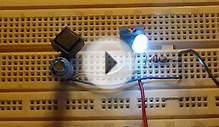A pioneering chip maker might do analog business in Silicon Valley. National Semiconductor is doing business as Silicon Valley Analog (SVA), a division of Texas Instruments (TI). SVA offers a variety of integrated circuits, especially analog and mixed-signal (which blends analog and digital functions) chips. The majority of its sales come from analog devices, which transform physical information - light, sound, pressure, even radio waves - into data that a computer can use. SVA's chips are used in wireless, networking, medical, solar, automotive, and industrial applications. It gets most of its sales from customers outside the US. In 2011 TI bought National Semiconductor for about $6.5 billion in cash.
TI was looking to expand in an effort to become the top maker of analog chips in the world. National Semiconductor's products extend the breadth of TI's product portfolio and strengthen its position in the analog market, as well as add a range of power management chips. The two companies also shared many of the same customers, and their chips wound up in many of the same products. The deal made financial sense for National Semiconductor, as the offer represented a premium of about 78% for its shareholders. TI plans to continue to operate the company's manufacturing sites in Maine, Scotland, and Malaysia, as well as its California headquarters. As a division of TI, National Semiconductor is operating under the Silicon Valley Analog moniker.
The company was active in acquisitions - and divestitures - as it shaped its product portfolio. Power management continues to be the predominant theme for SVA, which invests in products that boost energy efficiency, particularly for mobile electronics, communications infrastructure, renewable energy, medical, sensors, and detection equipment.
RELATED VIDEO
